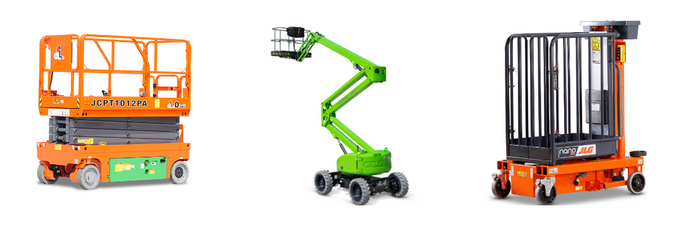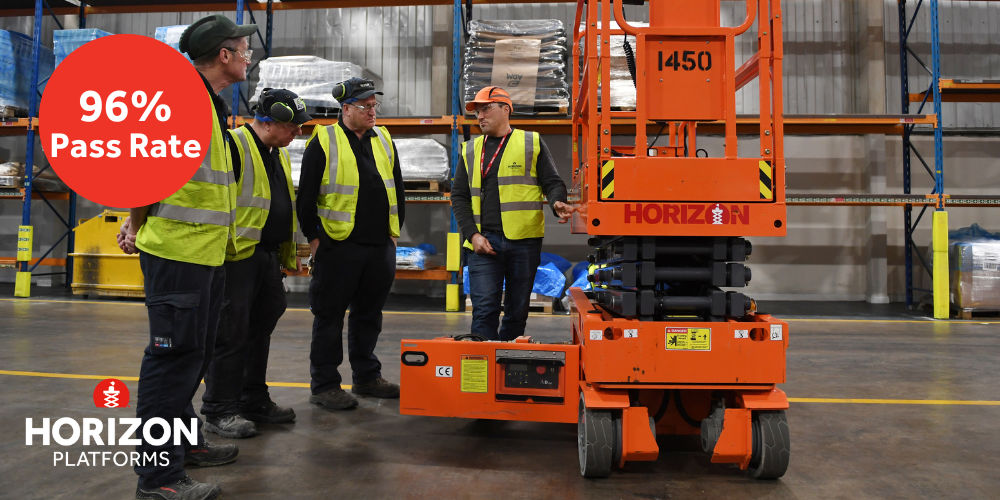The highest number of fatalities in the workplace are caused by falling from a height. With the majority of fatalities being in construction and many sites requiring people to work at height, following HSE guidance is paramount. Although using a MEWP (Mobile Elevated Work Platforms) will form part of health and safety (H&S) site rules and is one of the safest ways to work at height, the risk of injury or worse is always there, even for the most experienced operator.
Working with scissor lifts, cherry pickers, and other access platforms poses more risks than just falling. From entrapment or crashing the MEWP to dealing with overhead cables, site traffic or pedestrians, which highlights why the need to avoid complacency on construction sites through training and following rules is vitally important. When operators and managers complete MEWP training, and deploy comprehensive risk assessments and H&S good practice, any potential risks can be minimised.
In this blog, our experts share the importance of Powered Access Platform training, the courses available and further qualifications construction workers can obtain to guarantee they are working safely and doing all they can to minimise risks.
What Laws Govern the Use of Access Platforms?
As we know, operating and working around MEWPs carries a high degree of risk; this is why there is legislation in place to ensure workers and companies are aware of hazards and are fully trained on how to handle them.
Legislation includes Health and Safety at Work Act 1974, The Management of Health & Safety at Work Regulations 1999, The Provision and Use of Work Equipment Regulations 1998, the Lifting Operations and Lifting Equipment Regulations 1998 (LOLER) and the Working at Height Regulations 2005.
All stipulate that employers, managers, supervisors and MEWP operators should have appropriate training and information and be provided with safe work equipment – plus the right certifications – to provide a safe working environment.
Therefore, anyone involved in planning, supervising, managing or operating powered access needs to have comprehensive training to enable adequate risk assessment and appropriate safety measures, including pre-use inspections, to be in place to ensure operators and people working around them are all aware of any risks.
You may have further questions about IPAF training, from the structure of courses to MEWP controls. To help, our experts have brought together answers to the most frequently asked IPAF training questions. If you have any other queries, get in touch with our team.
What is the Importance of IPAF Training?
When meeting legal obligations, education and refresher training is key, and MEWP IPAF training is recognised as a gold standard.
The International Powered Access Federation (IPAF) is a leading authority for the safe use of powered access platforms, and completion of its MEWP training courses will give operators a Powered Access Licence (PAL), which demonstrates their competence in operating MEWPs.
MEWP training courses were created to implement industry-wide standards, ensure that all of those who work with MEWPs meet legal training requirements and assist with the reduction of accidents associated with the use of access equipment.
Choosing the right IPAF course is vital as programmes provide the different technical, theoretical and practical elements required to operate and manage the use of access platforms safely, and have been designed with expert input from industry professionals.
If you are interested in knowing more, read our blog about IPAF training and why it is important.
What Training Courses Do Horizon Platforms Offer?
Horizon Platforms’ IPAF courses for operators, demonstrators, instructors, managers, harness usage and site assessments for MEWP selection are delivered at our approved centres or on customer’s sites. Each of these programmes have been designed by IPAF to provide MEWP training in accordance with all relevant legislation, including Working at Height Regulations 2005.
Whether you are a contractor or operator interested in booking an IPAF course or an employer looking for accredited access platform training for your staff, there are different types of IPAF courses available and it’s important to choose the right one depending on the equipment the operator will be handling.
Operator courses
IPAF 1b course, which covers static cherry picker operation, and IPAF 1b/3a/3b, a combined training course for self-propelled vertical and scissor lift platforms, are the most commonly studied IPAF courses. We also offer any combination of 1b, 3a, and 3b to meet customer requirements.
Each provides all the theoretical and practical knowledge needed to operate a MEWP safely before work commences. This includes key dos and don’ts designed to keep operators and those around them safe while working at height.
Supervisory courses
Those who are overseeing the work of MEWP operators also need additional certifications which demonstrate they can safely ensure work is safely and properly carried out.
For demonstrators, the IPAF Demonstrator Course includes all the information staff need to familiarise themselves with the use of MEWPs. The IPAF Demonstrator course trains a demonstrator to familiarise operators with their responsibilities and to demonstrate pre-operational and safe operating procedures and the limitations of MEWPs. A step above operation, it covers pre-use checks, safe operation, emergency procedures, and familiarisation of the machine, but it does not include fall protection equipment.
Spanning a separate range of skills, the IPAF MEWPs for Managers Course covers elements including a thorough understanding of health and safety regulations and machine classifications. Companies that use MEWPs need to know their management and legal responsibilities and how to ensure the most effective use of MEWPs. The MEWPs for Managers course covers what managers need to know for safe and effective use of MEWPs on site, including planning the job, conducting a risk assessment, selecting the right equipment for optimum cost-efficiency and mitigating all possible risks.
- Do you know what your legal obligations are?
- Have you selected the right machine for the job at hand?
- Who is operating MEWPs on your site and have they been trained and familiarised?
- Have you considered the potential hazards and taken preventive measures?
This training course will help you answer these questions and prepare you to safely and effectively manage MEWPs on site.
Instructor courses
If you are interested in being a MEWP instructor, you must undertake a different type of training. Horizon Platforms IPAF Instructor Training Course is intensive, with stringent entry requirements.
You must have 36 months of powered access platform experience, have held an IPAF Operator Licence for a minimum of 6 months and have held an IPAF Demonstrator Licence for at least three months to complete this course.
Harness training course
Our harness awareness, user and inspector training course provides all the guidance MEWP operators need regarding correctly using and inspecting safety harnesses. This 3-module course will cover key aspects of harness safety whilst working at height, ensuring the proper health and safety legislations are met.
For more information on IPAF training, take a look at our ultimate guide to access platform training.
What Extra Qualifications Can Construction Workers Get?
From working at height training and ladder safety training to PPE, manual handling and fire awareness training, there is an abundance of recommended training courses and certifications that construction workers should undertake to ensure they are always working safely.
Certification with the CSCS Scheme
Although not a legal requirement, a CSCS (Construction Skills Certification Scheme) card is a highly reputable qualification within the construction industry. It’s common for construction firms to request this CSCS card before going on-site.
To obtain a CSCS card, you have to pass the CITB health, safety, and environment test to demonstrate that you’re competent in health and safety and understand the current health and safety regulations.
CITB Health and Safety Awareness
An ideal foundation for those wishing to obtain a CSCS card, this CITB health and safety course will ensure you are able to identify any potential risks to your safety and wellbeing and make sure you understand your responsibilities when working on a construction site.
Manual Handling Training
Manual handling training is vital for those carrying and lifting heavy objects. Courses train people on using practical manual handling solutions and techniques for lifting, minimising the occurrence of risks to yourself and others.
Get in touch with Horizon Platforms today to find out from our industry-led expert team which course is most suitable for your MEWP operatives and how you can get the relevant qualifications for the correct access platform.
If you’re looking for more information and access platform advice, bookmark the Horizon Platform blog to keep up to date.



